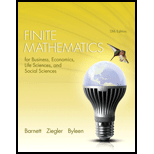
Problems 63 and 64 require the use of a graphing calculator
Market share. Acme Soap Company markets one brand of soap, called Standard Acme
Assuming that
Want to see the full answer?
Check out a sample textbook solution
Chapter 9 Solutions
Finite Mathematics for Business, Economics, Life Sciences and Social Sciences Plus NEW MyLab Math with Pearson eText -- Access Card Package (13th Edition)
Additional Math Textbook Solutions
Introductory Statistics
Calculus: Early Transcendentals (2nd Edition)
College Algebra (7th Edition)
University Calculus: Early Transcendentals (4th Edition)
Pre-Algebra Student Edition
Intro Stats, Books a la Carte Edition (5th Edition)
- 38 Mathematical Logic: Gödel's Incompleteness Theorems Task: Refer to Question 38 in the provided document. Link: https://drive.google.com/file/d/1wKSrun-GlxirS3IZ9qoHazb9tC440AZF/view?usp=sharingarrow_forward34 Discrete Mathematics: Graph Coloring Task: Refer to Question 34 in the provided document. Link: https://drive.google.com/file/d/1wKSrun-GlxirS3IZ9qoHazb9tC440AZF/view?usp=sharingarrow_forwardnot use ai pleasearrow_forward
- 3 5 Set Theory: Zorn's Lemma Task: Refer to Question 35 in the provided document. Link: https://drive.google.com/file/d/1wKSrun-GlxirS3IZ9qoHazb9tC440AZF/view?usp=sharing 3 6 Differential Equations: Sturm-Liouville Theory Task: Refer to Question 36 in the provided document. Link: https://drive.google.com/file/d/1wKSrun-GlxirS31Z9qoHazb9tC440AZF/view?usp=sharingarrow_forward40 Number Theory: Quadratic Reciprocity Task: Refer to Question 40 in the provided document. Link: https://drive.google.com/file/d/1wKSrun-GlxirS3IZ9qoHazb9tC440AZF/view?usp=sharingarrow_forwardConsider the inner product space R³ with the standard dot product. a) Show that the vectors V₁ = (1,2,3), V2 (4, 5, 6), and V3 = (7, 8, 9) form a linearly dependent set. b) Find the projection of = V3 onto the subspace spanned by V₁ and V2. c) Compute the orthogonal complement of the span of V1.arrow_forward
- Task: Refer to Question 58 in the provided document. Link: https://drive.google.com/file/d/1wKSrun-GlxirS3IZ9qoHazb9tC440AZF/view?usp=sharing 59 Mathematical Physics: Schrödinger Equation Task: Refer to Question 59 in the provided document. Link: https://drive.google.com/file/d/1wKSrun-GlxirS3IZ9qoHazb9tC440AZF/view?usp=sharingarrow_forward44 Tensor Calculus: Covariant and Contravariant Tensors Task: Refer to Question 44 in the provided document. Link: https://drive.google.com/file/d/1wKSrun-GlxirS3IZ9qoHazb9tC440AZF/view?usp=sharingarrow_forward22 Linear Algebra: Eigenvalues and Eigenvectors Task: Refer to Question 22 in the provided document. Link: https://drive.google.com/file/d/1wKSrun-GlxirS3IZ9qoHazb9tC440AZF/view?usp=sharing 23 Complex Analysis: Residue Theorem Task: Refer to Question 23 in the provided document. Link: https://drive.google.com/file/d/1wKSrun-GlxirS3IZ9qoHazb9tC440AZF/view?usp=sharingarrow_forward
- 24 Partial Differential Equations: Method of Separation of Variables Task: Refer to Question 24 in the provided document. Link: https://drive.google.com/file/d/1wKSrun-GlxirS3IZ9qoHazb9tC440AZF/view?usp=sharing 25 Topology: Properties of Compact Spaces Task: Refer to Question 25 in the provided document. Link: https://drive.google.com/file/d/1wKSrun-GlxirS3IZ9qoHazb9tC440AZF/view?usp=sharingarrow_forward32 Probability and Statistics: Bayes' Theorem Task: Refer to Question 32 in the provided document. Link: https://drive.google.com/file/d/1wKSrun-GlxirS3IZ9qoHazb9tC440AZF/view?usp=sharingarrow_forward30 Functional Analysis: Banach Spaces Task: Refer to Question 30 in the provided document. Link: https://drive.google.com/file/d/1wKSrun-GlxirS3IZ9qoHazb9tC440AZF/view?usp=sharingarrow_forward
 Algebra for College StudentsAlgebraISBN:9781285195780Author:Jerome E. Kaufmann, Karen L. SchwittersPublisher:Cengage Learning
Algebra for College StudentsAlgebraISBN:9781285195780Author:Jerome E. Kaufmann, Karen L. SchwittersPublisher:Cengage Learning College Algebra (MindTap Course List)AlgebraISBN:9781305652231Author:R. David Gustafson, Jeff HughesPublisher:Cengage Learning
College Algebra (MindTap Course List)AlgebraISBN:9781305652231Author:R. David Gustafson, Jeff HughesPublisher:Cengage Learning

